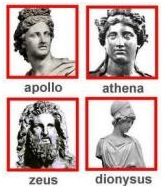|
 |
|
 |
|
|
||
Charles Handy, The Gods of Management (1985)
Irish oil executive who became a London Business School professor and renowned business philosopher (pictured right). His 1989 best-seller, The Age of Unreason, gave him global recognition.
See also... Charles Handy in the Management Gurus section.
Book summary Why is culture important? People’s effectiveness and motivation will be maximized, if they work in:
Inefficiency results from “cultural confusion” when different cultures compete for the same activity.
One culture isn't always best... It is wrong to assume there is one best culture (values, attitudes and management methods) for every employee. Four cultures are required for different tasks, situations and people, as represented by Greek gods - see below Organizations will normally need a mixture of the four cultures below for
different jobs, and they will under-perform, if they:
Four cultures
1. Club culture (Zeus) Autocratic and informal with power coming from:
This culture is ideal for quick decision making.
2. Role culture (Apollo)
This is best for stable and predictable conditions. The bureaucratic Apollo culture discourages individual creativity and innovation. This “Apollonian dilemma” can be resolved by:
3. Task culture (Athena) Emphasis on:
Power comes from:
This culture is ideal for:
In recent years the Athena culture has become more important, as change and innovation have increased.
4. Existential culture (Dionysus) Based on:
This culture is good for:
What about different countries? Different nationalities prefer different cultures. For example, the:
Key quotes on culture (from the 4th edition, 2007) Inappropriate cultures lead to unhappiness and inefficiency. Apollo must retreat. We must find ways of designing and running organizations in which the other gods predominate and in which Apollo is encouraged to have a human and smiling face.
Key quote on management (from the 4th edition, 2007) Management is the art of compromise.
|
|
|
||
|
|
||
| Copyright © wisdomtowin.com 2025 All Rights Reserved | ||
|










